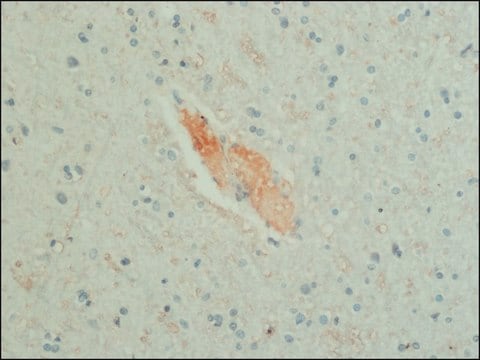Wichtige Dokumente
G6642
Anti-Glutamate antibody produced in rabbit
whole antiserum
Synonym(e):
Anti-Glutamate Ab, Glutamate Detection Antibody, Rabbit Anti-Glutamate
About This Item
Empfohlene Produkte
Biologische Quelle
rabbit
Qualitätsniveau
Konjugat
unconjugated
Antikörperform
whole antiserum
Antikörper-Produkttyp
primary antibodies
Klon
polyclonal
Enthält
15 mM sodium azide
Speziesreaktivität
wide range
Methode(n)
dot blot: 1:15,000
Versandbedingung
dry ice
Lagertemp.
−20°C
Posttranslationale Modifikation Target
unmodified
Verwandte Kategorien
Allgemeine Beschreibung
The actions of the excitatory amino acids on neurons are mediated by different receptor subtypes. These receptors are coupled to integral ion channels or to a second messenger system which utilizes inositol triphosphate (IP3). L-glutamate and L-aspartate may play an important role in the pathogenesis of certain neurological disorders such as Huntington′s disease, Alzheimer′s disease, epilepsy and brain ischemia. The excitoxic and neurotoxic effects of L-glutamate, leading to extensive neuronal damage, appear to be mediated by the N-methyl-D-aspartate (NMDA) receptor subtype.
Spezifität
Immunogen
Anwendung
Immunohistochemistry (1 paper)
Haftungsausschluss
Sie haben nicht das passende Produkt gefunden?
Probieren Sie unser Produkt-Auswahlhilfe. aus.
Lagerklassenschlüssel
10 - Combustible liquids
WGK
WGK 3
Flammpunkt (°F)
Not applicable
Flammpunkt (°C)
Not applicable
Analysenzertifikate (COA)
Suchen Sie nach Analysenzertifikate (COA), indem Sie die Lot-/Chargennummer des Produkts eingeben. Lot- und Chargennummern sind auf dem Produktetikett hinter den Wörtern ‘Lot’ oder ‘Batch’ (Lot oder Charge) zu finden.
Besitzen Sie dieses Produkt bereits?
In der Dokumentenbibliothek finden Sie die Dokumentation zu den Produkten, die Sie kürzlich erworben haben.
Unser Team von Wissenschaftlern verfügt über Erfahrung in allen Forschungsbereichen einschließlich Life Science, Materialwissenschaften, chemischer Synthese, Chromatographie, Analytik und vielen mehr..
Setzen Sie sich mit dem technischen Dienst in Verbindung.








